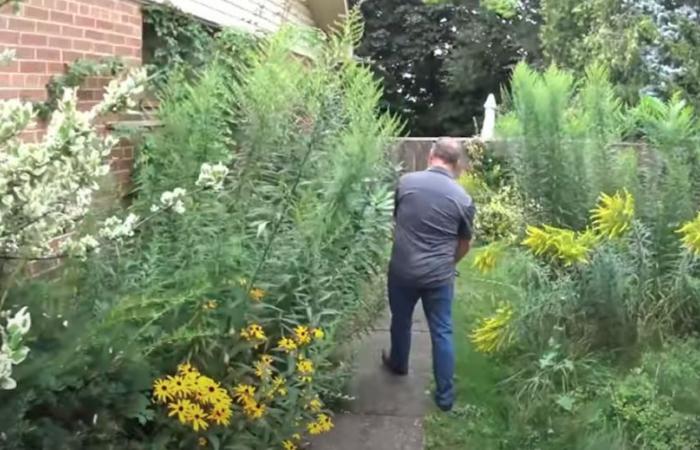Loading player
For some years, especially in Anglo-Saxon countries and media, there has been talk of the importance of rethinking the way in which grassy lawns outside homes are cared for and mowed in order to limit the effects of human activities on the environment. A very heterogeneous group of researchers, scholars and activists have developed around this idea who recognize themselves in a growing “anti-practist” movement: their main aim is to point out the existence of a notable imbalance between the environmental benefits of grassy lawns (i.e. the classic lawns of well-tended grass that are often seen in home gardens) and the negative consequences of maintenance, irrigation and other usual practices necessary to keep them always green and well-kept, and adapt them to the urban context and to the prevailing aesthetic taste.
In the city of Mississauga, in the Canadian state of Ontario, the desire of a resident to modify his garden in order to leave more space for native plants of the region has been at the center of a legal case for months which will soon land in the Court of Justice Ontario appeal, which is the last level of state judgment in the Canadian system. At the center of the case is the garden of Wolf Ruck, a seventy-year-old artist, director and former Olympic canoeist who in 2021 began to “renaturalize” his garden, essentially committing himself to returning his plot of land to the natural state it would have had if it were not for human intervention.
In Canada and the United States, local laws often closely regulate what a home or yard should look like: these laws often include vague and subjective terms like “clean” and “tidy,” and don’t define what that means. for “weed”. Any neighbor can then anonymously report a perceived violation.
Between 2021 and today, the City of Mississauga sent a crew to Ruck’s home to forcibly mow the grass twice after neighbors, who remained anonymous, complained that his lawn was unkempt. The city then ordered him to pay the cost of the service. Ruck argues that the Ontario Court of Justice has in the past already declared municipal laws regulating the height of grasses and weeds in private gardens to be null and unenforceable, and that in particular the way in which the Mississauga regulation is applied violates the section of the Canadian Charter of Rights and Freedoms that guarantees freedom of expression.
Ruck called the “tremendous amount of time, effort and expense” he is going through to ensure he can grow his own garden as he chooses “absolutely unreasonable.” The City of Mississauga says “tall grass and weeds are a public nuisance,” but has never explained exactly how it believes Ruck’s lawn poses a health or safety threat. For this reason, Ruck suspects that the nuisance in question is simply a violation of the aesthetic tastes of his neighbors: “my property is not abandoned,” he said. «It’s not a ruin for the community. It just seems to offend some neighbors who don’t like the way it looks.”
For now the lower courts have agreed with the municipality: on May 2 the Ontario Superior Court, the judge immediately below the Court of Appeal, recognized the ecological benefit resulting from Ruck’s encouragement of biodiversity and that the application of the law violates Ruck’s right to freedom of expression to some extent. But he also said that the city’s intention is to protect residents from the potential harmful effects of weeds and potential fires, and that therefore the city’s grass height laws have a utility that outweighs the “deleterious effects.” suffered by Ruck. “The fact that [Ruck] cannot grow exactly what he wants in his own garden does not mean that these laws do not comply with the Charter of Rights and Freedoms”, concluded the judge.
According to Nina-Marie Lister, director of the Ecological Design Lab at Metropolitan University of Toronto, Ruck is not the only one who has had problems with neighbors during his “rewilding” efforts. “The number of cases we have followed as consultants has more than quadrupled since 2020,” she told the Guardian. Lister’s lab has long been working with various Ontario municipalities to update their weed laws to accommodate the need to protect biodiversity.
«The advice we give to municipalities is to (…) recognize the right of residents to plant and cultivate native species», he explains. “The only condition must be that they are not harmful to human health or the ecosystem.”
– Read also: The importance of tall grass






